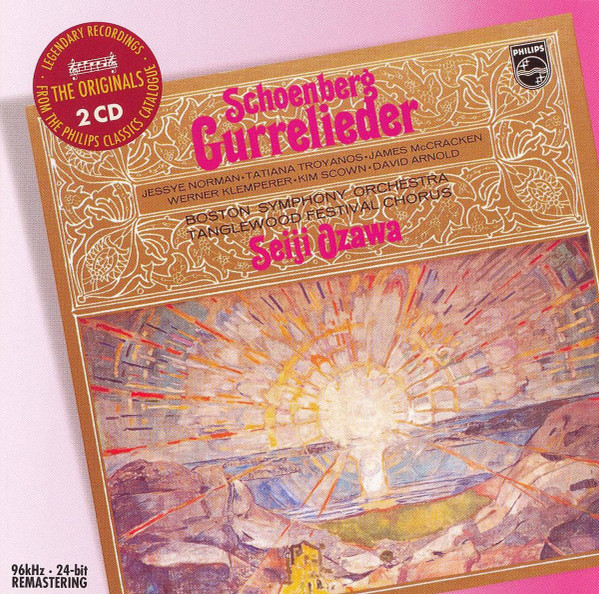Schoenberg certainly divides listeners.
The early works were too gargantuan and mushy sounding, while the later works were too off-putting, spurring a whole school of compositional thought. Enough, at least, to create a mafioso atmosphere in the concert hall and in academic circles.
At around 100 minutes, the Gurre-Lieder is front-loaded as a mammoth orchestrated song-cycle. The Second Part uses the chorus, at least providing some relief and variety for the audience, ending in quite the spectacle. For most of the work, however, Schoenberg rarely uses full forces.
Lest I forget, there is a sprechstimme portion, here uttered by Colonel Klink himself. Not the finest of this singing effect, but worthy of a mention.
This production is famous, perhaps even infamous. The soloist lineup is stellar. The late Seiji Ozawa marshals his forces well, although many find him too glib with tempos; I find them refreshing.
The production isn't showcased in a crystal clear fashion; but that is typical of a work requiring the immense size and proportions. Still, some might want to explore more recent sonic iterations.
A review from 2019
Performed
40 years ago in 1979, this remastered live performance of Arnold
Schoenberg’s über-Romantic Oratorio Gurrelieder is led by Seiji Ozawa
and the Boston Symphony Orchestra with the Tanglewood Festival Chorus,
headlined by MET stalwart James McCracken and soprano Jessye Norman and
further supported by Tatiana Troyanos, David Arnold, and Kim Scown.
Schoenberg’s secular cantata is extremely easy on the ears, at least
compared to his later discordant compositional style, the first half of
the work essentially an orchestrated song cycle for tenor and soprano
and the second half a wild romp for the rest of the cast and crew in a
true overblown, Mahlerian style.
Depending on how you like your
Mahler will greatly determine how you like your Gurrelieder. Personally,
I prefer my Mahler sunny, extroverted, and forward moving which is
probably why I like Ozawa’s Gurrelieder. He and Boston move swiftly over
Schoenberg’s gargantuan orchestrations, not cogitating over every
Romantic detail minutely, but giving a more gauzy-Impressionist feel,
perfect for Boston’s silvery-smooth string quality. Ozawa still erupts
blazingly throughout, showcasing the fine brass work of Boston, more
than earning the Gramophone album award that year. On the other hand, if
you prefer your Mahler plumbing the depths of man’s soul, examining
every possible musical rumination of the score, you are probably better
served with the recordings by Kegel, Sinopoli, and even perhaps Levine if you can find it at a decent price.
While Ozawa can
be as dramatic as any of those previously mentioned, this performance
exceeds in its array of soloists compared to most others. Heldentenor
James McCracken has a heroically-strong Baritone sound quality, well
suited for Wagner, and easily transferable to the musical stylings of
the Gurrelieder, only eclipsed by Heppner with Levine. Even moreso,
Jessye Norman’s full, Romantic sound is hard to beat on record and
additionally, for having two ideal lead players opposite one another.
Most will point to Janet Baker as the ultimate Wood dove, possibly even
Fassbender with Chailly, but I wouldn’t choose a recording for a
twelve-minute movement in a 100+-minute work as Troyanos is certainly
capable here. David Arnold is fine, as is the quirkily characterful
Scown as the jester, and all of the solo vocalists are heard
up-close-and-personal in relation to the orchestra giving an immediacy
to the proceedings and eclipsing most recordings on the vocal front.
Walter Klemperer (Colonel Klink) as the speaker is very animated,
although his less-than-authoritative abilities in Sprechstimme leans far
towards speech rather than balancing with singing; he is rather amusing
though.
The only drawback is the recorded capturing of the
Tanglewood Chorus, an ensemble that performs quite well here and is
heard over the orchestra well enough, but their slightly recessed
placement blurs the choral detail in their three movements that can be
found more satisfyingly in more recent recordings. This is not
dissimilar to other gargantuan works
(Vaughan Williams Sea Symphony
,
for example),
and the sound here does not bother me, but if you want
razor-sharp choral detail, this pre-digital recording won’t be the place
to look. Furthermore, Ozawa’s gauzy instrumental work doesn’t showcase
the crystal-clear inner detail of today’s recordings on the orchestral
front compared to the ones mentioned in the next paragraph, but this
classic recording easily projects the grand occasion and is performed
well (with only 3 or 4 instances of audience noise from the live
setting).
If you like the sunny, forward moving style of Mahler,
and Ozawa’s approach, but want a more detailed soundscape, compare to
Chailly who has much more inner detail instrumentally and a closer chorus, but for me, suffers with his soloists; Salonen has perhaps the fieriest second half after a not-too-solid first half and the classic recordings before Ozawa, Stokowski and Ferencsik, are well respected but in older sound. For me, I have always
been happy with Ozawa’s performance for his fleet-footed predilections
and the remastering gives the music more clarity and plenty of punch and
power.

Listen on YouTube
Works
Gurre-Lieder
Soloists
Jessye Norman, Tove
Tatiana Troyanos, Wood-Dove
James McCracken, Waldemar
Kim Scown, Klaus the Jester
David Arnold, Peasant
Werner Klemperer, Narrator
Ensembles
Tanglewood Festival Chorus
Boston Symphony Orchestra
Seiji Ozawa, conductor
Label: Philips
Year: 1979; 2006
Total Timing: 102.42

Some might take issue with Ozawa's speeds and the balances involved. I however have no such problem.
The work is ungainly, but it is an interesting look at a composer's development, one who divides listeners.
Find one you like and go for it! Ozawa for me!
Find more Schoenberg recordings HERE!



Comments
Post a Comment